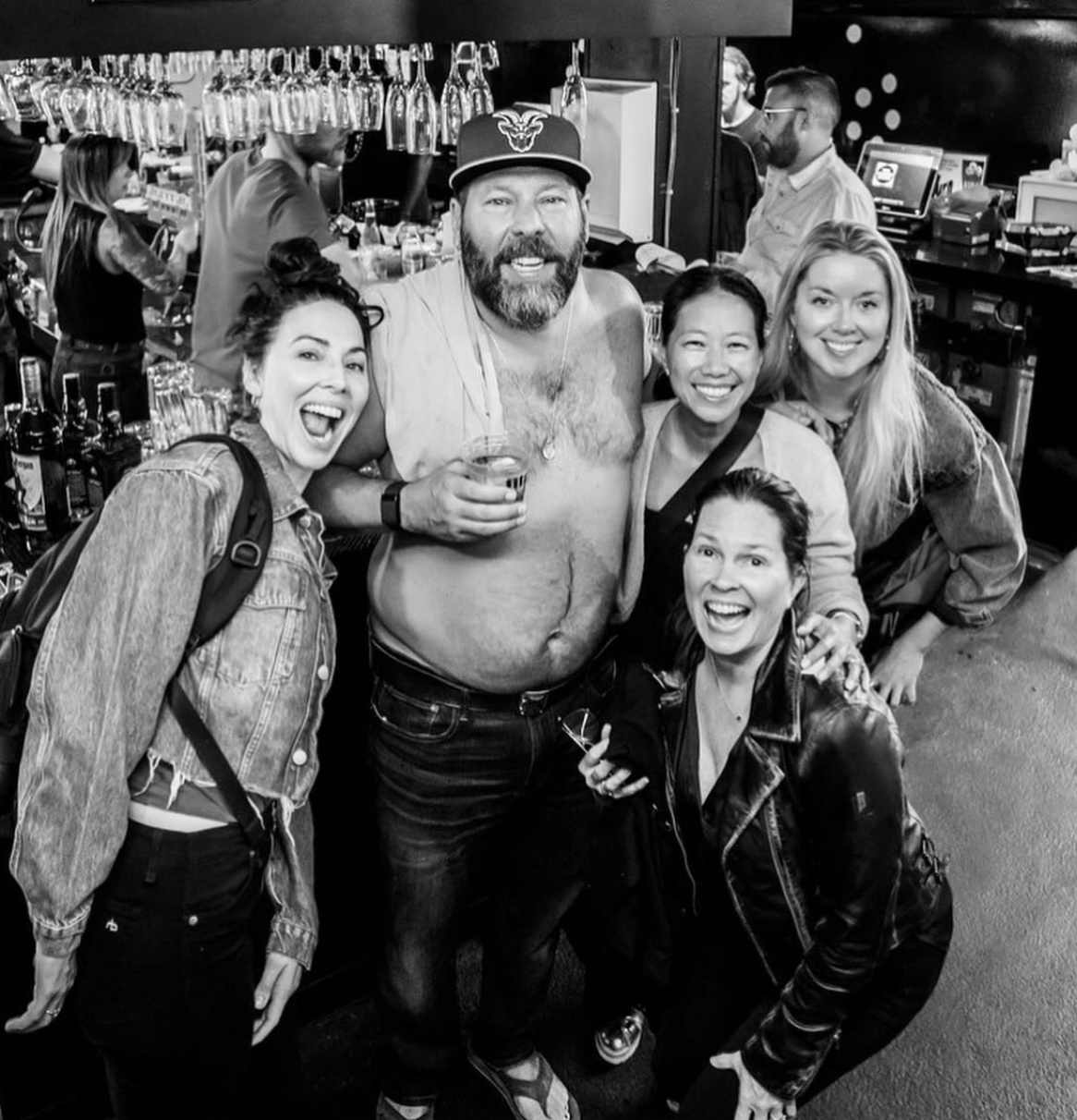Remember the whispers, the murmurs, the “Bert needs help” echoing across social media? Months later, those pleas seem like distant murmurs as Bert emerges, not with a mea culpa, but with a new weapon: his own branded alcohol.
This isn’t some quaint microbrewery launch. No, Bert sets his sights on the Super Bowl, America’s day of indulgence, transforming podcasts into his personal booze-soaked campaign trail. From crashing Pat McAfee’s show at 11 am, peddling vodka like snake oil, to his unsolicited shirtless push-ups – a cringeworthy spectacle no one needed.
For recovering alcoholics, it’s a gut punch. They see a distorted reflection of their own struggles – the desperate clinging to parties long over, the hollowness of forced revelry.
Despite the discomfort, the truth remains: Bert, as an adult, has the right to his choices.
But here’s the “but” – a resounding one. Leveraging your platform as a “comedian” to normalize excessive drinking during peak sporting events? That’s not harmless fun. It’s a betrayal of trust, a middle finger to those fighting addiction’s grip.
Remember, Bert isn’t just “some guy.” He’s a voice millions listen to, a figure who’s built his image on relatability and humor. Now, he uses that same voice to peddle a product demonstrably harmful to a significant portion of his audience.
This isn’t about policing personal choices. It’s about holding celebrities accountable for the messages they amplify, especially when those messages endanger vulnerable communities. The “Machine” – the celebrity persona, the fame, the fortune – shouldn’t shield him from the impact of his actions.
The “Bert Kreischer effect” shouldn’t be one of normalized excess and disregard for addiction’s realities. It’s time to challenge the narrative, to demand more from those we elevate. Let’s not let the laughter drown out the voices of those struggling, the communities silenced by the clinking of celebrity-endorsed glasses.
Why No Ones Laughing. Literally No One.
Berts, comedy aside and the jury is still out on that one. Here’s the rub: Bert, like many celebrities, lives a life most can only dream of. Lavish vacations, sold-out shows, access to the best experiences money can buy – it’s an enviable existence. But that dream-job facade becomes problematic when it’s used to peddle potentially harmful products to an audience struggling with everyday realities.
It’s a cruel irony. While someone like Bert navigates life’s challenges from a gilded cage, his audience often grapples with financial strains, job insecurity, and the very real struggles that substance abuse preys upon. To then leverage that dream-job image to normalize excessive drinking feels exploitative, preying on the very aspirations that might make his audience more vulnerable.
This isn’t about begrudging someone their success. It’s about recognizing the responsibility that comes with it. When you reach millions through laughter and relatability, that influence carries weight. Choosing to use that weight to promote products that disproportionately harm the very demographic you connect with creates a dissonance that’s hard to ignore.
Picture this, you get paid to live a life others dream of, then reward those that support you by pushing products that harm. Hard to get your head around but that’s too he world we are living in.
The dream job shouldn’t become a shield for promoting products that can turn dreams into nightmares. Celebrities like Bert have the power to inspire, uplift, and even educate. Let’s hope they choose to wield that power responsibly, understanding that the laughter shouldn’t come at the expense of their audience’s well-being.
Beyond the “Bert Kreischer Effect”: Shifting the Focus to Accountability and Support
While the “Bert Kreischer effect” raises valid concerns about the impact of celebrity endorsements on vulnerable audiences, focusing solely on individual struggles risks overshadowing the broader issue of responsibility and accountability. Ultimately, holding celebrities like Bert to account isn’t about personal attacks or armchair diagnoses, but about demanding conscious use of their platforms.
At Sober Standard we want to remain positive and hopeful this culture can turn around! It would be amazing to see someone like Bert at the front of that.
Let’s shift the conversation from speculation to action. Here are some ways we can move forward:
1. Demanding Transparency and Authenticity:
Instead of fixating on unconfirmed rumors, we can encourage open and honest dialogues about mental health and addiction within the entertainment industry. Celebrities, public figures, and media platforms can play a crucial role in dismantling stigmas and promoting help-seeking behaviors.
2. Supporting Responsible Marketing Practices:
Holding brands and marketing agencies accountable for ethical promotion is crucial. Consumers can use their voices to advocate for responsible advertising practices that avoid exploiting vulnerabilities and focus on genuine connection rather than harmful normalization.
3. Prioritizing Community-Based Solutions:
Instead of solely relying on celebrities for awareness, let’s elevate the voices of recovery communities and individuals directly impacted by addiction. Supporting grassroots organizations, sharing personal stories, and fostering positive narratives can create a more effective and sustainable impact.
4. Encouraging Open Communication and Empathy:
Open and compassionate conversations about addiction and mental health within our own communities can create a network of support and understanding. Stigma thrives in silence; let’s break down barriers and offer empathy instead of judgment.
By shifting the focus away from speculation and towards collective action, we can create a more responsible and supportive environment, both for those struggling and for those wielding significant influence. This is the true goal, and achieving it requires us to move beyond the “Bert Kreischer effect” and work towards a more informed and compassionate future.
Fortunately Bert lives in the US and there’s a huge network of support available such as AA that has a wealth of free resources available.
Sober Standard has also put together 5 steps you can take right now to help you on your journey to sobriety.
